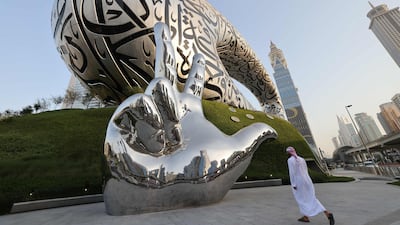Business activity in Dubai's non-oil private sector economy hit a five-month high as output expanded on stronger increases in both jobs and inventories, with growth rates reaching multiyear records.
The emirate's seasonally adjusted S&P Global purchasing managers' index reading in March jumped to 55.5, from 54.1 in February, remaining well above the neutral 50 mark separating expansion from contraction.
“Companies reported greater efforts to build supply-side strength in light of a further rapid expansion in activity levels,” said David Owen, a senior economist at S&P Global Market Intelligence.
"The subsequent increases in staffing levels and inventories of materials and components were the sharpest seen in around five years, allowing firms to increase their output to the greatest extent for six months."
Companies continued to report a marked improvement in client demand during March.
As new business inflows rose sharply companies increased hiring, with the pace of job creation picking up the fastest since January 2018, according to the survey. Construction firms in particular had a strong increase in employment levels.
Dubai's economy expanded by 4.6 per cent on an annual basis in the first nine months of 2022, with wholesale and retail trade accounting for 24.1 per cent of its gross domestic product, according to data from the emirate's statistics centre.
Emirates NBD estimates Dubai's full-year 2022 growth at five per cent and expects the emirate’s GDP to grow by 3.5 per cent in 2023.
The tourism sector, a key component of the emirate's economy, has made a strong rebound from the coronavirus-induced slowdown.
Hotels in Dubai ended 2022 with a strong performance across industry metrics in December as tourists flocked to the city after travel restrictions eased, drawn by cooler weather and new year celebrations.
Revenue per available room, a key gauge of performance for the hotel industry, rose about 31 per cent to Dh684 ($186) from December 2019, before the Covid-19 pandemic, according to hospitality data and analytics specialist STR.
Dubai hosted 12.82 million overnight international visitors in the first 11 months of 2022, more than 85 per cent of the pre-coronavirus levels during the same period in 2019, according to the latest available data from Dubai’s Department of Economy and Tourism.
The emirate's 11-month performance is also more than double the 6.02 million people who visited the city in the same period in 2021, the government data showed.
Dubai's property market also had a record-breaking 2022, with further price increases registered in December.
The market recorded 90,881 transactions in 2022, exceeding the previous high of 81,182 in 2009, property consultancy CBRE said in its Dubai Residential Market Snapshot report.
Businesses registered the fastest acceleration since May 2018 in stocks of inputs, as firms purchased greater volumes of raw materials to service new and current projects, according to the latest PMI survey.
Supplier delivery times continued to shorten as vendors worked to tighter customer requirements. The overall rise in business expenses was modest and remained softer than the long-run trend.
Output prices fell for the eighth month running and businesses cited efforts to offer price discounts to customers and maintain robust sales volumes.


